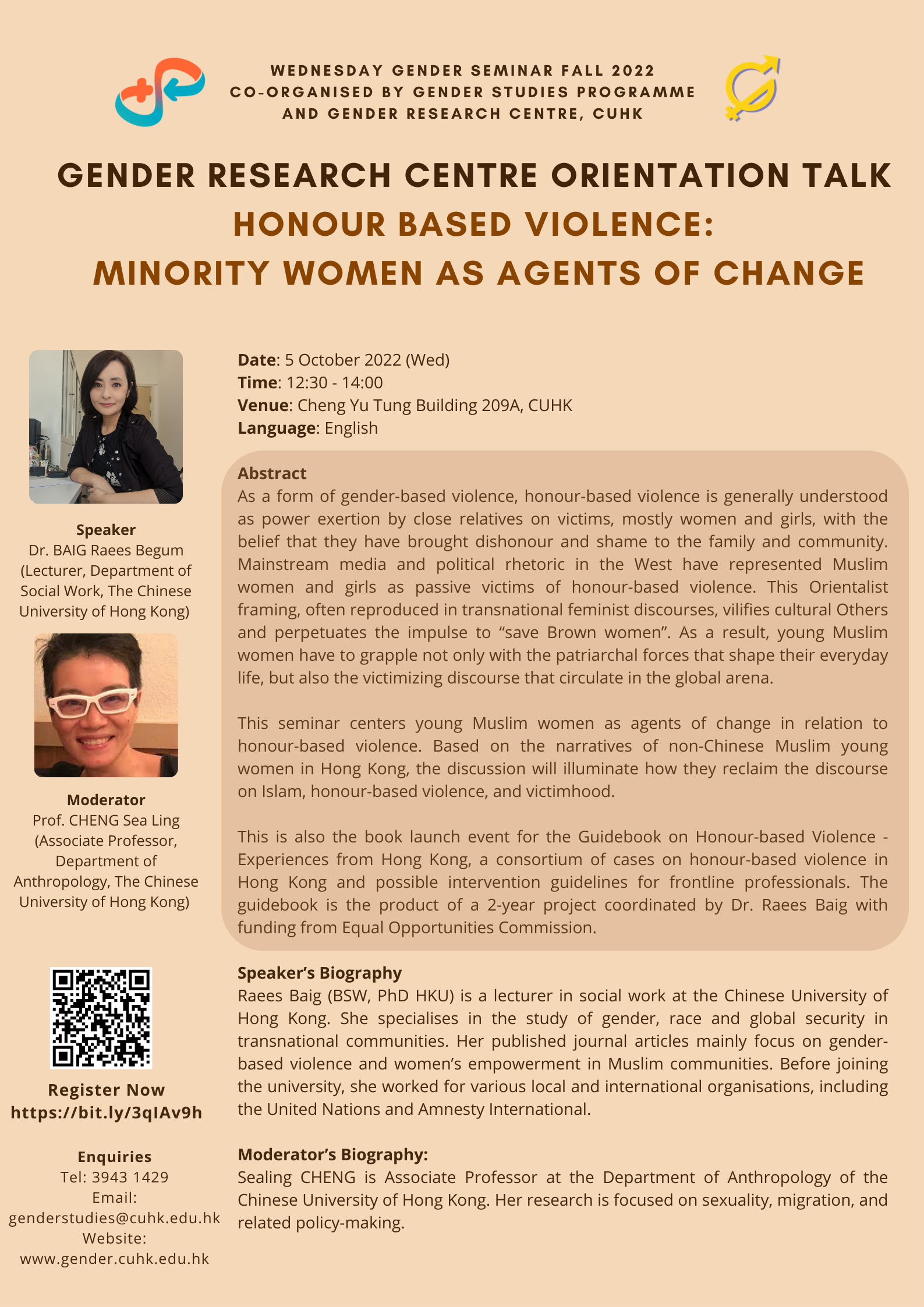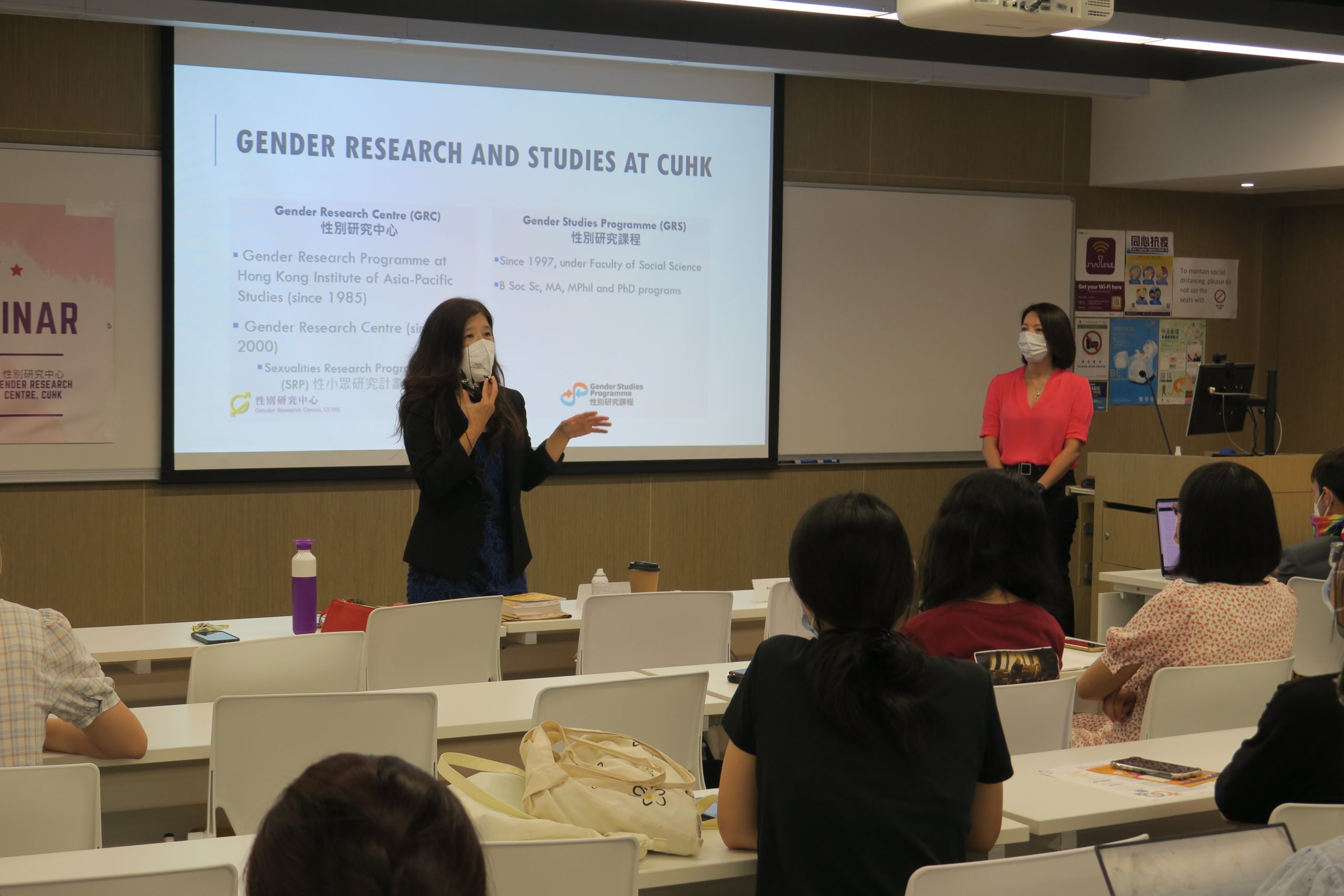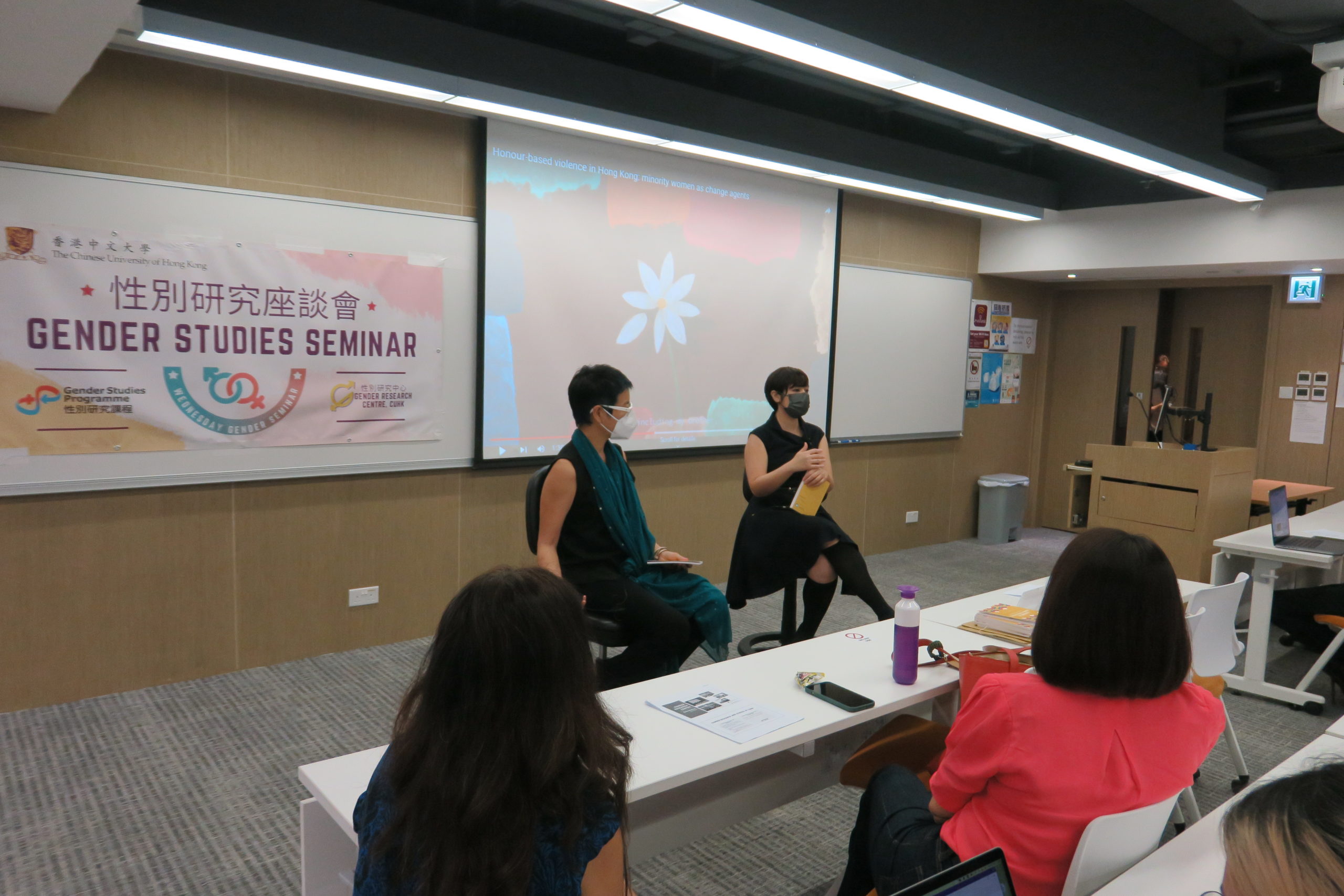At Gender Research Center Orientation Talk on 5 October 2022, Dr. Raees Baig shared the research project Honour Based Violence: Minority Women as Agents of Change and presented a guidebook which is the product of this project.
During her involvement in local NGO’s investigation and assistance on domestic violence, she noticed that some Muslim women in Hong Kong were suffering from domestic violence because they were thought to brought shame to the family and community . She began to focus on their situation and try to connect with them. At the beginning she realized that Muslim women who had experienced honour-based violence, although they may not understand “honour-based violence” as an umbrella term, were able to share awareness of certain violence and poor power positions, while they also had a lot of confusion about marriage, sex and romantic relationships. Dr. Raees Baig then set up a workshop to give these women a platform to share their experiences and gender equality ideas, allowing them to connect the concepts and terms to their own experiences and identities.
However, the younger generation who have been subjected to honour-based violence are no longer passive victims, they have escaped from the official ideology through the internet and self-study of the Qur’an, and have learned about the political and religious contexts of their experience and many notions of gender equality. They try to escape their families or teach their families the new ideas they have embraced, in order to change the awful father-child relationship.
When asked if the project had helped to heal and empower the women victims, Dr. Raees Baig thought that it was important to give people who had experienced honour based violence or domestic violence more space to share their experiences, which helped them to realize and understand their situation. She also felt that their project has gone some way to challenging the global victimizing discourse of Islamic women by giving these women themselves the opportunity to speak about their effort to change the situation.
撰文:LI Xiangyi
A guidebook focusing on Honour-Based Violence (HBV) was shared in the seminar in order to address the issue of HBV of young Muslim women in Hong Kong. Their HBV experiences were revealed in the booklet, aiming to explore the way they interpreted their experiences in religious and cultural perspectives, and promisingly, initiating discussions and concerns on HBV cases in Hong Kong.
The seminar is facilitated by Dr. BAIG Raees Begum and moderated by Prof. CHENG Sea Ling in a Questions & Answers approach. Dr. BAIG first shared about the motivation behind the project, their interests in investigating how the young Muslim women perceive phenomenons such as domestic violence, HBV, forced marriage in their own words. Surprisingly, the younger generation has more thoughts on differentiating their culture and religion; they also have stronger mobility on their Muslim identities and their personal autonomy when comparing to the older generation who refused to relate themselves to sexual topics.
Dr. BAIG further explained the use of the word ‘honour’ and the underlying reason for young women being the agent of change but not victim-survivors of HBV. The ground of honour is strongly correlated with pride and reputation, in social contexts, on the other hand, honour also refers to standards and behavioural guidelines encouraged by the community. In fact, Dr. BAIG revealed that young women exposed to HBV are not only perpetrated by their father or other male relatives, female members sometimes play an assisting role in the process of HBV. HBV is therefore notably family-based in Islam culture.
Nonetheless the traumatic stress experienced by the young women, Dr. BAIG mentioned they expressed a longing for rebuilding their family’s relationship, breaking through these down the ages, agony family dynamics. With an eye to leap forward the family hierarchy, those brave women tried to regain their dignity in becoming a change agent instead of labelled as victim-survivors in their situations. They further share their self exploration process through this project to break the original Muslim teaching myth, meanwhile fighting for their identity of being a Muslim.
撰文: LI Yeuklam
The seminar on Oct 5th has been successfully held. Compared with the previous seminars, this one has some special components. First is the orientation of Gender Research Center. The GRC is an organization specializing in gender issues at the Chinese University of Hong Kong, and Prof. Lynn demonstrated the academic and practical achievements of the GRC by presenting the center’s past research projects, book publications, workshops, and other activities and it was committed to recruiting members for this seminar. The second part is Dr. BAIG Raees Begum’s sharing of her 2-year project of the honour-based violence (HBV) focus on the non-Chinese Muslim young women in Hong Kong, also the publication of the guidebook based on the real experience and cases of the HBV investigated in this project.
What motivated Dr. Baig to conduct this project must be recalled from a social work experience that took place several years ago. At the time, Dr. BAIG was cooperated with one local NGO to work on domestic violence. During the work, they discovered that the situation could be religious and cultural ways. Although the previous generation of non-Chinese Muslims living locally in Hong Kong may not understand the ture meaning of the academic terms like “domestic violence” or “forced marriage”, they can express this sentiment in their own language. However, the young female generation, with the fully understanding of these term, strong self-identity, and highly opening thoughts of ideal relationship, tend to use their own voices to challenge the rigid culture. These young females started to subvert abuse and the inequalities they feel within their families. Hence the initial phase of this product: to create a platform for them to talk more about these concepts on gender issues.
Moving to the topic of “women as agents of change”in this scenario, Dr. Baig explained that from the interacting with these girls they really see how the girls grew up, how they changed their self-perceptions and how they changed their families, even if they were experiencing abuse and violence. Women in the domestic violence isn’t victims anymore, we can see how they breakthrough these situations and some of the cases the girls even developed the capacity to educating they parents and rebuild family bonds.
In summary, HBV is a form of family-based violence, and in Hong Kong society today, neither social work nor the legal system has a good solution to HBV and a host of other problems such as physical control and forced marriage. On the one hand, society should build on this, but on the other hand, we should also see how women in such domestic violence gradually developed to find their own way to defend themselves.
撰文:QIAN Xiaoxuan





A
A
A
聯絡我們